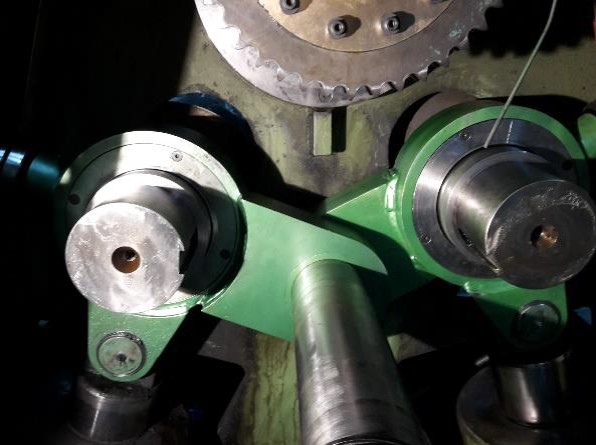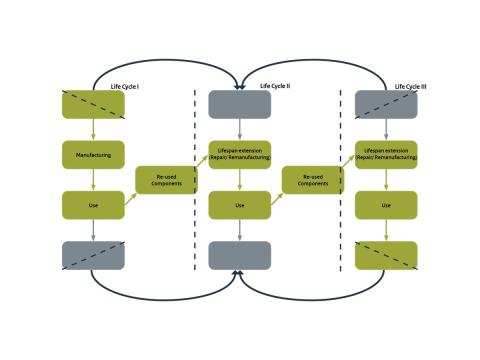Best ECO-op: How much advantage does Remanufacturing offer?
A methodology to determine the ecological footprint and costs of machine components with multiple life cycles.
Centre of Expertise Digital Operations & Finance

A methodology and ultimately a tool with which SMEs in the Netherlands can demonstrate the benefits of their remanufacturing processes; the proportion of components that they reuse, expressed in ecological footprint and costs, considering different life cycle stages.
This allows the reporting on eco-footprint while considering circular processes like remanufacturing in a more standard way and create better communication and collaboration between companies and environmental accounting firms.
Background
Dutch manufacturing companies can play a leading role in the transition to a circular economy. It requires smarter and more efficient reuse of materials and especially of products or components. Resource autonomy is important. However, currently the environmental benefits of reusing products are difficult to demonstrate. It is an extensive and costly task to determine the environmental impact. Even more so when comparing 'New' versus 'Remanufactured' products. At the same time, manufacturing companies in the SME sector often deal with higher costs compared to importing a new product which is cheap and has low sustainability. The Best ECO-op project responds to this issue with a method that provides insight into both the financial benefits and the advantages in terms of environmental footprint.
Aim
The project focuses on developing a standardized way to determine the ecological footprint and total costs of a 'Remanufactured' product. A fair way to divide the footprint between the different life cycles of parts is particularly crucial in this matter. Modelling all cycles for a system overview of how extending service life and allocating embodied burdens fairly across cycles leads to a clear visualization of decreasing carbon footprint and eco-costs with reuse.
Research
When calculating the environmental impact by conducting an LCA (life cycle analysis), or when calculating the life cycle cost (LCC), modelling recycling is somewhat standardized, but modelling reuse is not yet a standard exercise. This is a shortcoming because the ecological footprint when reusing parts can be much lower than when recycling materials. However, correctly allocating the footprint for the different life cycles of that part raises a multitude of questions regarding for example how to assign burdens without double counting, how to show credits or benefits without the risk of greenwashing. It is also important that a standardized route is determined such that the results of one company or product are comparable to another in terms of methodology.
Expected results
The project offers a standardized method for allocating costs, environmental burdens, and credits across each use cycle, making it possible to assess the footprint of a 'remanufactured' product. The objectives are captured in a demo that lays the foundation for developing a widely applicable system for the Dutch mechanical engineering manufacturing industry in more detail. It allows businesses to:
- show the added value of the remanufacturing process and thus make sustainable choices attractive to their customers' purchasing departments.
- improve the selection of products for circular reuse,
- anticipating European regulations with a transparent and applicable system.
Target group
For manufacturing companies in the SME sector with a circular business model that want to make their added value transparent for customers and be prepared for upcoming European laws and regulations.
Collaboration partners
Best ECO-op is a collaboration between the Smart Sustainable Manufacturing research group of The Hague University of Applied Sciences and various companies and organisations, including:
- HTC Speedgates
- Botau Engineering & Construction
- CS Staal
- Nederlandse Metaalunie and Metaalunie Zuid Holland
Besides the main stakeholders we ask internal and external experts to act as critical reviewers when making important choices.
Duration of the project
November 2024 – October 2025
Funding
The Taskforce for Applied Research SIA is subsidizing the project within the KIEM-MV scheme.
Team
Research group Smart Sustainable Manufacturing, The Hague University of Applied Sciences:
- Hugo Makkink, project lead, lecturer-researcher
- Jenny Coenen, professor
- Jenna Coward, lecturer-researcher
- Emiel Kaper, lecturer-researcher
Contact
Hugo Makkink, [email protected]
Jenny Coenen, [email protected]
